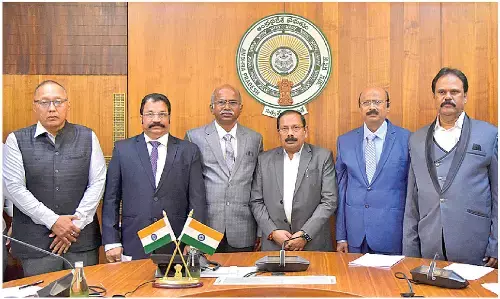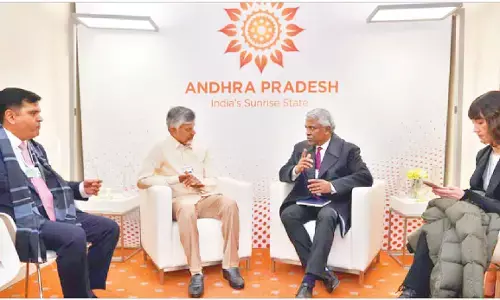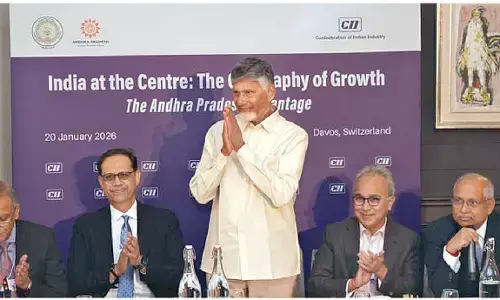Incubating rural ideas key for startup push

Incubating rural ideas key for startup push
Rural entrepreneurship can also show the way for inventive and cost-effective models for startup development
THE startup ecosystem in India, home to over 41,000 active startups has expanded tremendously over the past decade. While it has emerged as the world's third largest startup ecosystem, with 38 firms being valued at over $1 billion, or 'unicorns', it has tended to gravitate towards select urban centres. In a country where over 60 per cent of the population hails from rural provenances, this is a glaring obstacle in the way of inclusive innovation and development. Rural and grassroots innovation often finds itself outside mainstream economic imaginations and gets little endorsement from governmental and international actors. Bridging this gap in India's innovation trajectory would require extending what was offered to urban innovators to their rural counterparts— support, promotion and incubation.
Once we appraise why rural innovation must be incubated, it can be discerned that it is not simply an ethical choice to make, but also a certain way to integrate specialisations and skills from the rural economy into the mainstream and generate massive amounts of revenue. Successful incubation programmes do not merely launch businesses but bring regional networks of contact and capital in synergy with the national economy. For example, Sasisekar Krish's 'nanoPix', based in the Hubli district of Karnataka, founded with donations and loans amounting to less than a crore, makes image and video processing products for agriculture and healthcare and could generate revenues of over Rs 2.2 crore in the year 2014. With greater support and promotion, non-urban entrepreneurial ventures could scale greater heights.
Rural entrepreneurship can also show the way for inventive and cost-effective models for startup development. As Sanchit Khera, writing for a noted publication remarks, urban startups generally rely on the western model of pre-money funding or scaled revenue generation. In contrast to this, rural innovation, with limited funds, relies on the acumen of individual innovators who come up with solutions to local needs which lead to prominent breakthroughs. Arunachalam Muruganantham from Coimbatore, popularly known as Padman, invented low-cost sanitary pad-making machines, which run all over the country and internationally credits his origins to the problem of hygiene among women in rural India. Widely appreciated as a social entrepreneur who has generated tremendous local employment and social impact, his success story is an exemplification of the untapped excellence that lies in the non-urban parts of the country.
Several such innovators populate the landscape of Indian talent. In Jharkhand, for instance, the National Innovation Foundation recognised ritual inventions ranging from portable welding machines to tower irrigation systems. What rural India effectively needs is greater acknowledgement of its novel creations and greater financial and promotional support. Incubators dedicated to this mission can make all the difference in this regard and governments must energise such ventures. The government of Telangana has led by example in this direction, with the setting up of the Telangana State Innovation Cell (TSIC) that aims to promote grassroots innovation and has supported noteworthy rural-origin businesses like Vishwaja Reddy's HiCode and has reached all thirty-three districts of the State. WE-Hub, the government-backed startup incubator for women, one of its kind in the country engaged over 3,000 women entrepreneurs and breached the urban-rural divide.
If Telangana's success story is anything to go by, the difference incubating rural entrepreneurship can make is likely to be nothing short of gargantuan. When the incubator boom reaches villages and smaller towns, poverty, which continues to be rampant in rural pockets can be countered with employment generation, funding and promotion of local talent and a culture of innovation. Incubation centres should be established across all districts of the country to provide assistance to emerging and existing businesses and enable them to accomplish major breakthroughs, alongside bringing their narratives to national consciousness.
The policy measures to be demanded in this regard would include development of financial services in non-urban regions and bridging of the digital divide. On one hand, availability of banking services and provision of funds are crucial to bolstering the capacity of communities to use financial resources better. On the other hand, the presence of digital infrastructure can enable wider and immediate connectivity with the national consciousness and economy. Incubators can engage experts and bring the academia-industry collaboration to villages to nurture regional human capital and provide them access to new markets and the larger economic sphere.
There is no national development without keeping everyone on board and a holistic and inclusive approach towards the same has to do justice to grassroots entrepreneurs and rural endeavour and talent. With greater emphasis on the same, coupled with substantial initiative, India can anticipate monumental advances.
(The author is Founder, Upsurge Global, and Senior Advisor, Telangana State Innovation Council)















